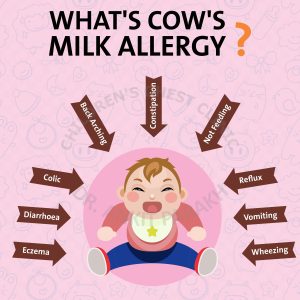 Cow’s milk protein intolerance (CMPI) refers to an abnormal response by the body’s immune system to a protein found in cow’s milk, which causes injury to the stomach and intestines.
Cow’s milk protein intolerance (CMPI) refers to an abnormal response by the body’s immune system to a protein found in cow’s milk, which causes injury to the stomach and intestines.
It is not lactose intolerance.
Risk factors: having a relative who has a history of CMPI, or has atopic disease or allergic disease.
Breastfeeding may protect infants from developing CMPI.
These proteins can be found in breastmilk if the mother has ingested cow’s milk herself.
CMPI can be IgE-mediated or non-IgE mediated.
Immunoglobulin E is an antibody typically seen in allergic disease.
In IgE antibody mediated CMPI, symptoms can start within 2 hours of drinking cow milk.
In non-IgE-mediated CMPI, symptoms can occur 2 days to 1 week after ingestion of cow’s milk.
Symptoms of CMPI develop within the first week of starting cow’s milk in their diet.
Clinical findings may include a skin rash or eczema, or involvement of the GI tract.
GI involvement manifests as vomiting, abdominal pain, blood in the stool, mucousy stool, and diarrhea.
Prolonged exposure in infants could lead to wheezing, irritability and poor growth / failure to thrive.
Diagnosis:
History and physical examination are the most helpful.
Timing of the symptoms, age of the patient, and symptoms related to feeds are key to diagnosis.
Diagnosis supported by an improvement in symptoms after the elimination of cow’s milk.
Treatment is to remove cow’s milk protein from the diet.
Typically, the diet starts with an extensively hydrolyzed formula which is a formula of broken down proteins.
A small percentage of patients may require an amino acid based formula.
Continuing breastfeeding infants with CMPI, the mother will need to eliminate all dairy and soy products from the diet.
Most infants on cow’s milk-free formulas or breastfed by a mother on a milk-free/soy-free diet will need to remain on the diet until about 12 months of age.
Most kids will outgrow CMPI by one year of age.
The majority will do so by 3 years of age.
